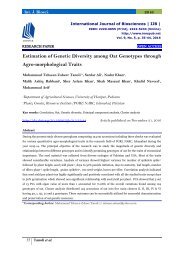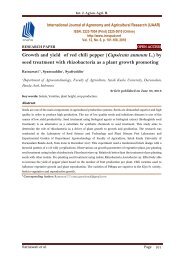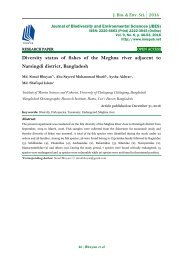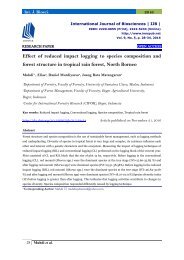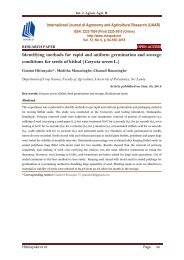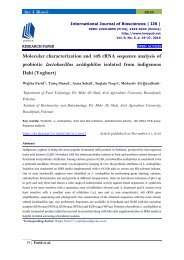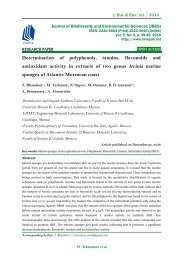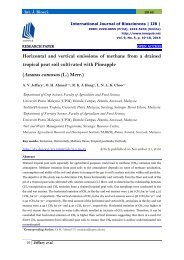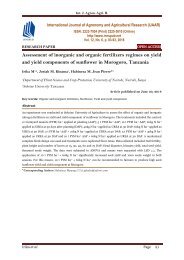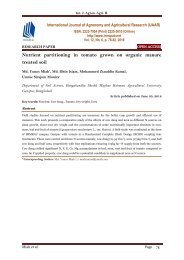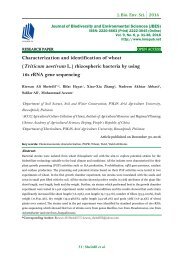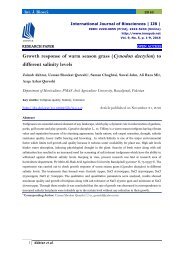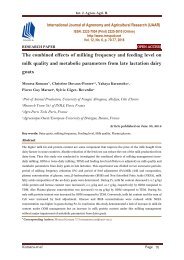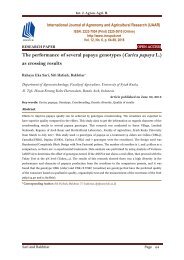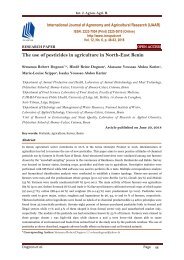Optimizing zinc seed priming treatments for improving the germination and early seedling growth of wheat
Zinc (Zn) is an essential micronutrient with various vital metabolic, enzymatic and defensive roles in crop plants. This study was conducted to optimize the seed priming treatments, with Zn in improving the germination and early seedling growth of wheat. Experiments were conducted in petri plates and sand filled pots, respectively in Allelopathy laboratory, Department of Agronomy, University of Agriculture Faisalabad, during 2012. The experiments were laid out in completely randomized design in factorial arrangement with four replications. Seeds of two wheat cultivars Lasani-2008 and Faisalabad-2008 were soaked in aerated Zn solution of various concentrations (0.5, 0.1, 0.05, 0.01, 0.005 and 0.001 M Zn) for 12 h. Seeds soaked in aerated water for 12 h (hydropriming) and untreated dry seeds were taken as control. Wheat seeds primed in 0.1 to 0.01 M Zn solution increased the earliness, uniformity and final germination percentage in wheat. Beyond this concentration, there was adverse effect on germination and seedling growth of both wheat cultivars. Seed priming with 0.1 to 0.01 M Zn solution also improved the root and shoot length and seedling dry weight.
Zinc (Zn) is an essential micronutrient with various vital metabolic, enzymatic and defensive roles in crop plants. This study was conducted to optimize the seed priming treatments, with Zn in improving the germination and early seedling growth of wheat. Experiments were conducted in petri plates and sand filled pots, respectively in Allelopathy laboratory, Department of Agronomy, University of Agriculture Faisalabad, during 2012. The experiments were laid out in completely randomized design in factorial arrangement with four replications. Seeds of two wheat cultivars Lasani-2008 and Faisalabad-2008 were soaked in aerated Zn solution of various concentrations (0.5, 0.1, 0.05, 0.01, 0.005 and 0.001 M Zn) for 12 h. Seeds soaked in aerated water for 12 h
(hydropriming) and untreated dry seeds were taken as control. Wheat seeds primed in 0.1 to 0.01 M Zn solution increased the earliness, uniformity and final germination percentage in wheat. Beyond this concentration, there was adverse effect on germination and seedling growth of both wheat cultivars. Seed priming with 0.1 to 0.01 M Zn solution also improved the root and shoot length and seedling dry weight.
Create successful ePaper yourself
Turn your PDF publications into a flip-book with our unique Google optimized e-Paper software.
Int. J. Agron. Agri. R.<br />
In petri-plate maximum plant height was noted in <strong>seed</strong>s<br />
primed with 0.001 M Zn solution in cultivar Lasani-<br />
2008, which was followed by hydro<strong>priming</strong> in <strong>the</strong> same<br />
cultivar. Minimum plant height was noted in <strong>seed</strong><br />
osmoprimed with 0.5 M Zn solution in cultivar<br />
Faisalabad-2008, which was followed by <strong>seed</strong> <strong>priming</strong><br />
with 0.001 M Zn solution in <strong>the</strong> same cultivar (Fig.. 4 a).<br />
In s<strong>and</strong> medium maximum plant height was noted in<br />
hydro<strong>priming</strong> in cultivar Faisalabad-2008, which was<br />
followed by <strong>seed</strong>s osmoprimed with 0.001 M Zn<br />
solution in <strong>the</strong> cultivar. Minimum plant height was<br />
observed in <strong>seed</strong> <strong>priming</strong> with 0.5 M Zn solution in<br />
cultivar Lasani-2008. Cultivar Faisalabad-2008 had<br />
longer plants than cultivar Lasani-2008 (Fig.. 4b).<br />
Fig. 4. Influence <strong>of</strong> <strong>zinc</strong> <strong>seed</strong> <strong>priming</strong> on plant height (cm) in <strong>wheat</strong>; V1: Lasani-2008; V2: Faisalabad-2008 ± S.E; (a)<br />
petri-plate; (b) s<strong>and</strong> filled pots. (HP = Hydro<strong>priming</strong>; 0.5, 0.1, 0.05, 0.01, 0.005, 0.001 = Seed <strong>priming</strong> in solution <strong>of</strong><br />
respective molar solution <strong>of</strong> <strong>zinc</strong>).<br />
In petri-plate maximum root length was noted in<br />
hydro<strong>priming</strong> in cultivar Lasani-2008 while<br />
minimum root length was noted in <strong>seed</strong> osmoprimed<br />
with 0.5 M Zn solution in cultivar Faisalabad-2008,<br />
which was followed by <strong>seed</strong> osmoprimed with 0.001<br />
M Zn solution in <strong>the</strong> same cultivar (Fig.. 5a). In s<strong>and</strong><br />
pots maximum root length was noted from<br />
hydro<strong>priming</strong> in cultivar Faisalabad-2008, which was<br />
followed by <strong>the</strong> <strong>seed</strong> osmo<strong>priming</strong> with 0.001 M Zn<br />
solution in <strong>the</strong> same cultivar. Minimum root length<br />
was noted in untreated <strong>seed</strong> <strong>of</strong> cultivar Lasani-2008,<br />
which was followed by hydro<strong>priming</strong> <strong>and</strong><br />
osmo<strong>priming</strong> with 0.5 M Zn in <strong>the</strong> same cultivar.<br />
Cultivar Faisalabad-2008 had longer roots than<br />
cultivar Lasani-2008 (Fig.. 5b).<br />
In petri-plats maximum shoot length was observed in<br />
<strong>seed</strong> <strong>priming</strong> with 0.005 M Zn solution in cultivar<br />
Faisalabad-2008 while minimum shoot length was<br />
noted in <strong>seed</strong> osmoprimed with 0.5 M Zn solution in<br />
<strong>the</strong> same cultivar. However, shoot length <strong>of</strong> cultivar<br />
Faisalabad-2008 was more than cultivar Lasani-2008<br />
(Fig.. 6a). By using s<strong>and</strong> filled pots maximum shoot<br />
length was note in <strong>seed</strong>s osmoprimed with 0.001 M<br />
Zn solution in cultivar Faisalabad-2008, which was<br />
followed by hydro<strong>priming</strong> in cultivar Lasani-2008.<br />
Whereas minimum shoot length was noted in <strong>seed</strong><br />
osmoprimed with 0.5 M Zn solution in both cultivars<br />
<strong>and</strong> <strong>seed</strong> osmoprimed with 0.1 M Zn solution in<br />
cultivar Lasani-2008 (Fig.. 6b).<br />
Fig. 5. Influence <strong>of</strong> <strong>zinc</strong> <strong>seed</strong> <strong>priming</strong> on shoot length (cm) in <strong>wheat</strong>; V1: Lasani-2008; V2: Faisalabad-2008 ± S.E; (a)<br />
petri-plate; (b) s<strong>and</strong> filled pots. (HP = Hydro<strong>priming</strong>; 0.5, 0.1, 0.05, 0.01, 0.005, 0.001 = Seed <strong>priming</strong> in solution <strong>of</strong><br />
respective molar solution <strong>of</strong> <strong>zinc</strong>).<br />
Hassan et al. Page 24




